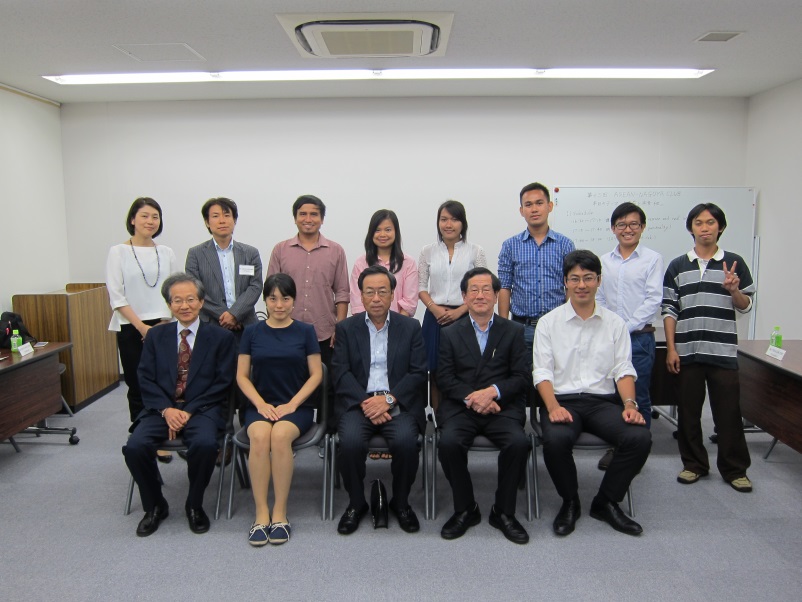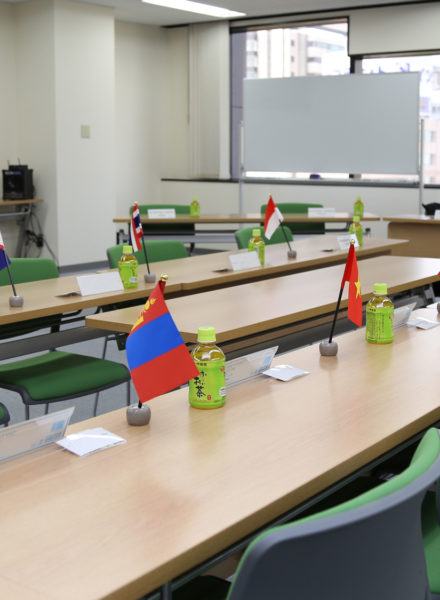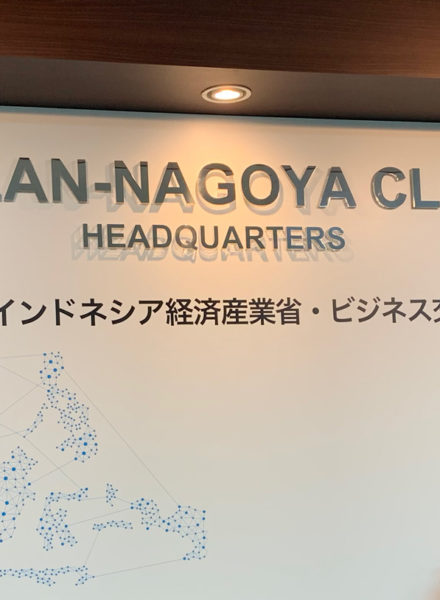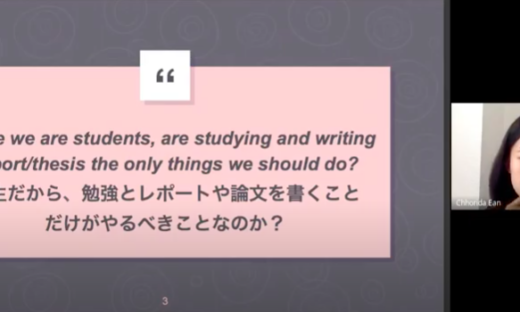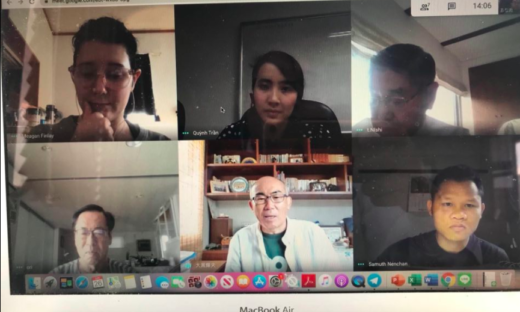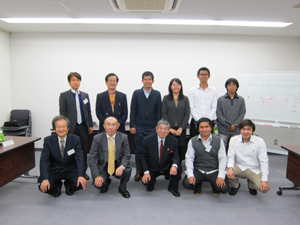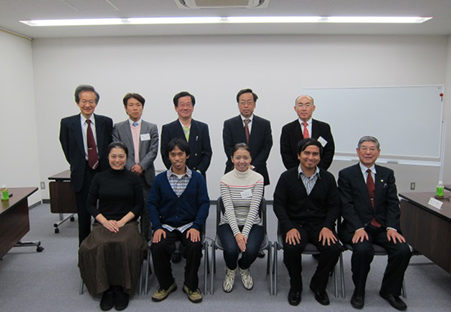第13回ミーティング報告書 2015年8月27日 (The 13th Meeting Report August 27, 2015)
建前と本音
ASEAN-NAGOYA CLUBも2年目に入りました。今月は「建前と本音」に迫ります。5月に採り上げたSeniorityのテーマにも関連するのですが、昔から日本国内にもある「建前と本音」の構造を考えてみます。留学生から、日本人の話しは、建前なのか、本音なのかわかりにくいという疑問があがりました。
【建前と本音】
「私たちの国の料理はいかがですか?」との問いに、日本人は「おいしいですね」と答えてくれるのですが、「料理は食べられずにたくさん残っている」というのです。日本人は「本当はおいしくない」と思っているのではないか、という疑問が湧くというのです。おなかがいっぱいで、本当においしいけれども、今は食べられないというケースもあるでしょう。しかし、内心、口に合わないと思っていても、相手の立場を思い、このようなわかりにくい応答をする人も多いのが日本人です。
私たち日本人は、島国の中で、長い歴史を過ごして来ました。対立や戦争をして他の地域へ逃れることはできない。限られた国土の中で、「仲良く」暮らしていかなければなりません。大和の国は、大きな和の国と書きます。聖徳太子以来、歴史的に和は大切にされてきました。地域の調和を図るのに、村八分という手段で、和を乱す力を封じてきました。相手との関係を損なわないように、自分の本音とは異なる、建前で伝える習性が身についているかもしれません。
本音だけで日々を過ごしていれば、対立は必ず起こります。建前と本音を使い分けるのは、日本人だけなのか。ASEAN各国の留学生の皆さんと意見交換しました。 留学生から、「ラオスにもインドネシアにも、人の心を思いやるという建前はある。どこの国にもあるのではないか」。という意見が出ました。そのほか、様々な意見がでましたが、どの国の人も関係を損なうような言い方はしないのが普通であり、日本人だけが、建前をと本音を使い分けているわけではないという認識になりました。
ただ、日本だけに見られる特殊な現象があるという議論がありました。それは会議です。問題解決のための会議です。それはきわめて論理的な作業です。問題を解決するためには、本音で議論しなければなりません。日本人はこの論理的な会議の席でも、人間関係を損なうのを恐れ、建前と本音を使い分けることが多いという指摘がありました。ASEAN諸国では、問題解決のためであれば、例え、上司や年上の人が相手であっても、本音で進めるといいます。この点においては、日本はどうも、会議参加者の人間関係に配慮し、本音を言うのをためらう傾向が、まだあるようです。
しかし、技術革新のスピード、グローバリゼーションのますますの進展を考えるとき、日本人が行ってきたような、会議における建前と本音を使い分けるようなやり方は、今後は、全く通用しないに違いない、というのがOBからの共通の見解でもありました。その意味では、日本社会も、建前と本音を使い分けることはなくなっていくに違いありません。
【時間厳守】
留学生から、時間厳守について次のような質問がありました。日本人社会は正確な時間の上に成り立っています。留学生だけではなく、海外の人が一様に驚く、交通システムにおける正確な時間。日本社会は、隅々まで正確な時間で溢れています。その中で留学生の質問は、具体的なものでした。「日本人と約束した時、自分は何分前に、指定された場所に行けばよいのか」、というきわめて具体的な悩みでした。
日本人OBの意見です。日本人の中にも、時間を守らない人はいます。時間を守る人が、ほとんどなのですが、守らない人もいます。時間を守らないというだけで、その人は信用を失うのが日本社会。では、その分岐点はどこにあるか。結論です。それは「5分」です。ジャストインタイムが、理想なのですが、それは難しい。では、どこまでその幅が許されるのか。遅れることはまずいのですが、早すぎても困ります。20分も早く来られては、迷惑します。しかし、20分も遅れては、もっと迷惑します。遅れそうなときは電話をする。その分岐点が、「5分」という意見が大半でした。日本社会では、遅刻は「5分」までという認識があるようです。このミーティングの後、留学生のみなさんは、その後の会合では、「きれいに5分前」に到着するようになりました。
【リスクテイク】
最後に、「日本人はリスクをとらないように見える、物事に対して準備に時間をかけ、なかなかリスクをとらないようにみえる。これはなぜですか」、という質問がありました。母国への日本からの投資態度に、そのようなことを感じるというのです。アジアのほかの国は、準備に十分時間をかけずに、積極的に投資を行います。しかし、日本の投資に対する動きは非常に遅いと感じます。この違いは何か。
海外での投資責任者として、指揮にあたったOBの共通する見解は、以下のようなものでした。投資行動には、大きな責任が伴います。投資を行い、状況をみてすぐやめるわけにはいきません。投資を行った以上、継続して事業を行わなければならなりません。株主以外にもステークホルダーは多い。そうした人に、説明責任を果たすためには、相当の準備を行わなければなりません。また現在、サラリーマン経営者がほとんどです。現在の日本の企業の実態からすれば、独断専行型の投資は数少ないといえます。他のアジア諸国のリスクテイクは、経済発展の歴史が日本に比して相対的に浅く、オーナー型経営者が多い、ということが大きく関係しているというのがOBの見解でした。
Honne and Tatemae
The theme of our discussion this time is “Honne and Tatemae”. This structure of “tatemae and real intention” that has been in Japan for a long time. In Japan, honne are a person’s true feelings and desires (本音, hon’ne, “true sound”), and tatemae are the behavior and opinions one displays in public (建前, tatemae, “built in front”, “façade”).
This distinction began to be made in the post-war era. Honne may be contrary to what is expected by society or what is required according to one’s position and circumstances, and they are often kept hidden, except with one’s closest friends. Tatemae is what is expected by society and required according to one’s position and circumstances, and these may or may not match one’s honne. In many cases tatemaeleads to outright telling of lies in order to avoid exposing the true inward feelings. The honne–tatemae divide is considered by some[who?] to be of paramount importance in Japanese culture.
For example, when foreigner asked Japanese “How about the food in our country?”, they would answer “It’s delicious”, but “I can’t eat much food and I have a lot left. “. The question arises that Japanese people think that it is not really delicious. There may be cases where you are full and really delicious, but you can’t eat it now or the food is actually not delicious but Japanese just finds a way not to be rude. However, there are many Japanese people who think about the other person’s position and give such an incomprehensible response even if they do not agree.
Japan has a long history as an archipelago country. We cannot flee to other areas in conflict or war. We have to live “friendly” in the limited land. Yamato no Kuni is written since Prince Shotoku. In order to harmonize the region, we have blocked all the things that disturb the harmony by means of Murahachibu. For example, by being careful in communicating to harmonize relationship with other people.
If you only focus on your true intentions, conflict will surely occur. That is why Japanese always implement “tatemae and honne” principle in their daily life. One of the international students said, “In both Laos and Indonesia, there is a premise of respecting other people’s feeling.
I think it is in every country. In addition, there were various opinions, but it is normal for people in any country not to say something that would ruin the relationship, and it became recognized that not only Japanese people use their true intentions properly.”
Although related to things that are crucial in the meeting, Japanese people will still consider about this Tatame and Honne principle. They still hesitate to speak up their mind in considering the relationship even though a variety of opinions will help a lot in making good decisions.
However, In ASEAN countries, they don’t hesitate to say their opposite opinions as long as it is important for the progress and the development of the corporate. However, when considering the speed of technological innovation and the further progress of globalization, it’s time for the Japanese not to fully use this principle as this will influence the negotiation in the future.
[Punctuality]
International students asked the following questions about punctuality. Foreigners visiting Japan get very impressed by how everything there is timely. In fact, this is true. To confirm this assumption, one just has to cite the high-speed rail network (Shinkansen) between Tokyo and Osaka as an example. Despite having a territory that is usually battered by earthquakes, the transport has an average delay of 30 seconds.
But punctuality is not restricted to trains. The Japanese are also very punctual. People are always anxious not to be late to their appointments. In general, they arrive 10 or 15 minutes before the scheduled time. Therefore, time regulates the life of the modern Japanese citizen. A person can lose a credibility just because he/she is not well timed. There seems to be a recognition in Japanese society that the late arrival is up to “5 minutes”.
[Risk taking]Finally, there was a question, “Japanese people don’t seem to take risks, they take time to prepare for things, and they don’t seem to take risks easily. Why is this?” One of the Japanese cultural traits that most affects business is the strong desire to avoid risk. While this cultural trait is responsible for certain successes of Japanese organizations, such as a high level of quality and carefully considered decision-making.
The answer in many cases has to do with the risk dimension. When risk-averse people like the Japanese feel that they need more information, they tend to stall. More information, and the right information, is what makes them feel less sensation of risk, and thus become more comfortable moving forward. The key, then, is to better understand what concerns Japanese have, what aspect of the risk makes them most uncomfortable.
Other Asian countries are willing to invest in less time to prepare. However, the movement toward Japanese investment is very slow. What is this difference?
As the investment manager overseas, the common views of the alumni who commanded were as follows. Investing behavior comes with great responsibility. You can’t just make an investment and see what’s going on. As long as you have made an investment, you must continue to do business. There are many stakeholders other than shareholders. To be accountable to them, we must make considerable preparations.
Currently, most of them are salaried managers. Given the current state of Japanese companies, it can be said that there are only a few investments that are self-directed. The OB’s view was that risk-taking in other Asian countries is largely related to the fact that the history of economic development is relatively short compared to Japan and that there are many owner-type managers.
参加者:
<日本人メンバー>
小里氏、鈴木氏、春名氏、箕浦氏、倉科氏、松久氏(コーディネーター)、田中氏(スタッフ)
<留学生メンバー>島津先生(コメンテーター)、Mr.Mardiansyah Mardis、Mr.Indra Kesuma Nasution、Mr.Pak Chanlino、Ms.Sisouk Boualaphiane、Ms.Sreyden Vong、Mr.Lim Lyhong、Ms.Jaroonruangrit Nalynya、Mr.Chheourn KuyEng
Participants:
Mr. Ori, Mr. Suzuki, Mr. Haruna, Ms. Minoura, Mr. Kurashina, Mr. Matsuhisa (coordinator), Mr. Tanaka (staff).
Ms. Shimazu (Commentator), Mr. Mardiansyah Mardis, Mr. Indra Kesuma Nasution, Mr. Pak Chanlino, Ms. Sisouk Boualaphiane, Ms. Sreyden Vong, Mr. Lim Lyhong, Ms.Jaroonruangrit Nalynya, Mr.Chheourn KuyEng.
